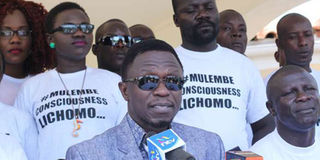Why ‘Jenerali’ Namwamba should be worried

Budalangi MP Ababu Namwamba addresses the media in the constituency at a press conference on July 17, 2016 in which he played down Deputy President William Ruto's allegation that he was joining Jubilee. PHOTO | TOM OTIENO | NATION MEDIA GROUP
What you need to know:
- The problem is that the Mulembe consciousness Ababu Namwamba is touting is an anachronism and a mirage in an increasingly urbanising Kenya, whose youth are shedding tribal tags.
- People—and that includes media personalities who are purporting to help forge Luhya unity—are daydreaming.
- Although the Luhya population is only second to Kikuyus’ in size, who have produced three of Kenya’s four post-independence presidents, Luhya sub-tribes are too divided and introverted to constitute a winning power bloc.
The unfolding drama in Budalangi, a remote enclave in the expansive "Mulembe territory", has sparked considerable debate and seemingly sent jitters through the ranks of leading opposition party ODM.
There can be no better proof of the anxiety Budalangi MP Ababu Namwamba’s resignation as ODM secretary-general has caused than the party leader’s ongoing tour of western Kenya, to breathe “Peace! Be still” on a restive vote bloc.
The question is whether Mr Namwamba’s antics, which assumed bizarre proportions during the swearing-in on January 15, 2008 of the 10th Parliament in the aftermath of post-election violence, should be taken seriously.
On that Tuesday night, the Budalangi legislator literally held Parliament hostage when he rejected the official swearing-in formula, insisting instead on pledging his loyalty to ODM boss Raila Amolo Odinga.
Who would have known that eight-and-a-half years down the line, Jenerali, as Mr Namwamba is popularly known, would be dancing to a different tune, and spewing venom on his erstwhile hero?
A report in the Nation in which Deputy President William Ruto claimed credit for poaching disaffected Cord members confirmed rumours of Jubilee's involvement in the carefully choreographed defections. While Mr Ruto’s glee at striking at the heart of Cord would worry any party leader, not least Mr Odinga, whose fortunes seem to be waning, Mr Namwamba should be worrying even more for his political future.
Indeed, one would have expected the son of Bunyala to have learnt a lesson from Amani leader Musalia Mudavadi, who was sponsored to contest the 2013 presidential elections in a move calculated to undermine Mr Odinga's clout in western Kenya.
While Mr Odinga’s undoing was ignoring smaller communities, which account for some 40 per cent of Kenya’s population, Mr Mudavadi also lost, as his votes did not add much to the UhuRuto influence in the House.
A MIRAGE
The problem is that the Mulembe consciousness Mr Namwamba is touting is an anachronism and a mirage in an increasingly urbanising Kenya, whose youth are shedding tribal tags.
People—and that includes media personalities who are purporting to help forge Luhya unity—are daydreaming. Although the Luhya population is only second to Kikuyus’ in size, who have produced three of Kenya’s presidents, Luhya subtribes are too divided and introverted to constitute a winning power bloc.
The last population census of 2010 put the numerical strengths of Kenya’s five major tribes as follows: Kikuyu, 6.6 million; Luhya, 5.3 million; Kalenjin, 4.9 million; Luo, 4 million and Kamba, 3.8 million. This shows that while no single ethnic community has the numerical edge to rule Kenya single-handedly, the Luhyas are even less able to pose any threat to a presidential contender.
This is because while perennial rivals Kikuyus and Luos are backed by fanatical followers, who will vote to the last man and woman to see their own at State House, Luhyas congregate around the various subtribes that constitute the larger community. In the current situation, three distinct groups exist.
The Maragoli are solidly behind Musalia Mudavadi; the Bukusus are split between Eugene Wamalwa and Moses Wetang’ula and the rest continue to back Mr Odinga.
While the 2013 General Election was a two-horse race between Uhuru Kenyatta and Mr Odinga, Mr Mudavadi denied Mr Odinga critical votes that would have forced the much-anticipated run-off and possible entry into State House.
Still, Mudavadi gained nothing, and that is the fate that lies ahead for Jenerali.
Dorothy Kweyu is a freelance writer and consulting editor; [email protected].




